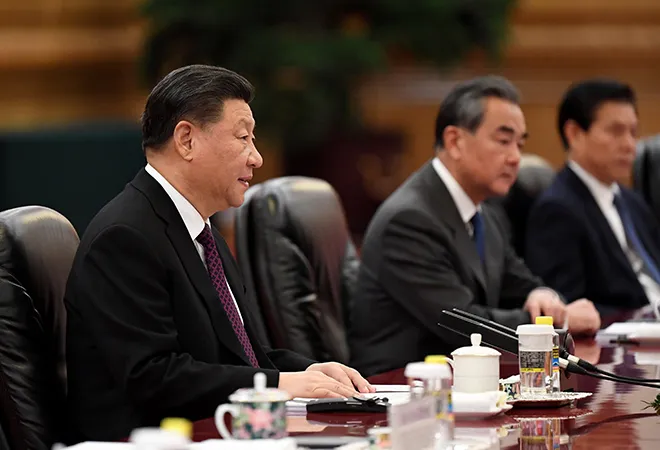-
CENTRES
Progammes & Centres
Location

The wolf warrior diplomatic style was perhaps suited more to the age of Donald Trump, but now that the Joe Biden administration has lowered the rhetoric on “America First”, the challenge for China is even more acute. China’s new-gen diplomats have been asked to defend the indefensible in recent years, from Beijing’s atrocities on minorities and its hyper-militaristic foreign policy to the opacity and mishandling of Covid-19.
In a seeming admission that all is not well with Chinese diplomacy, President Xi Jinping is aiming for a course correction, at least in rhetoric. Underlining the importance of presenting an image of a “credible, loveable and respectable China,” he told Chinese Communist Party (CCP) officials recently that he wanted his nation to “expand its circle of friends” by revamping its image. Xi emphasised the need “to make friends, unite and win over the majority, and constantly expand the circle of friends
Underlining the importance of presenting an image of a “credible, loveable and respectable China,” he told Chinese Communist Party (CCP) officials recently that he wanted his nation to “expand its circle of friends” by revamping its image
All nations want to tell a positive story about themselves. But for the Chinese leadership, this is a rare acknowledgement that its hyper- aggressive diplomatic style has backfired. China’s wolf warrior strategy has meant cultivating a diplomatic style which is inherently undiplomatic, as it seeks to confront, attack, demean and even abuse other nations when Beijing is challenged. This was done at the behest of China’s top leadership that wanted to showcase to the world that today’s China, rather than being bullied, would itself become a bully. Now that Xi wants to change the tone and tenor of Chinese public engagement, he is implicitly acknowledging that the costs of such an approach, encouraged by him in the first place, have led to diminishing returns, with China’s global profile severely dented.
It was Xi who wanted to project China as a superpower-in-the-making by moving away from Deng Xiaoping’s “hide-and-bide” strategy of keeping a low international profile. This meant China reacting strongly against perceived violations of its core interests, resulting in a dip in ties with many countries, some of which wanted to keep China in good humour. And now it seems that while Xi’s diplomats have delivered, Chinese diplomacy has suffered seriously.
As per recent polling data, views on China have turned negative in several countries, including the United States (US), the United Kingdom, Germany and Canada, in the past year. The European Union (EU) was keen on maintain stable relations with Beijing but China’s aggression led the EU to respond forcefully. Similarly, a neighbour such as the Philippines, which at one point was keen on getting closer to China, had to backtrack in face of aggressive Chinese posturing.
Xi now wants his nation’s propaganda organisations to tell the world that Beijing wanted “nothing but the Chinese people’s happiness and good fortune”. But it won’t be easy to tell this story after antagonising large parts of the world. The wolf warrior diplomatic style was perhaps suited more to the age of Donald Trump, but now that the Joe Biden administration has lowered the rhetoric on “America First”, the challenge for China is even more acute. China’s new-gen diplomats have been asked to defend the indefensible in recent years, from Beijing’s atrocities on minorities and its hyper-militaristic foreign policy to the opacity and mishandling of Covid-19.
The wolf warrior diplomatic style was perhaps suited more to the age of Donald Trump, but now that the Joe Biden administration has lowered the rhetoric on “America First”, the challenge for China is even more acute
But beyond the style, what is key is action. And here it is highly unlikely that CCP will give up its regional and global aspirations, which have resulted in an aggressive foreign policy posture. Even if Chinese diplomats tone down their rhetoric, Beijing’s expansive foreign policy ambitions will continue to bring it into confrontation with its neighbours and other major powers.
Reflecting on his engagement with China, Henry Kissinger, the former US secretary of state, wrote that “Beijing’s diplomacy was so subtle and indirect that it largely went over our heads in Washington.” None of that subtlety exists today as China redefines its global role and agenda. While the Chinese leadership may now be realising that its diplomatic style needs a revamp, there is no indication that there is a rethink on Chinese policies. Stylistic shift without a substantive rethink won’t lead to a significant change in perceptions. But what recent developments underscore is that the costs are rising for China when it comes to its bullying tactics and for all the talk, there is hardly any plan to deal with it.
This commentary originally appeared in Hindustan Times.
The views expressed above belong to the author(s). ORF research and analyses now available on Telegram! Click here to access our curated content — blogs, longforms and interviews.

Professor Harsh V. Pant is Vice President – Studies and Foreign Policy at Observer Research Foundation, New Delhi. He is a Professor of International Relations ...
Read More +